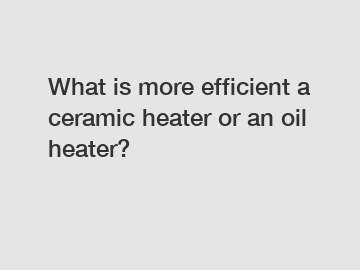What is more efficient a ceramic heater or an oil heater?
What is more efficient, a ceramic heater or an oil heater? This is a common question among consumers looking for an effective and cost-efficient way to heat their homes. Both ceramic heaters and oil heaters have their advantages and drawbacks, and it ultimately comes down to personal preference and specific heating needs. In this article, we will explore the key points to consider when choosing between these two types of heaters.
1. Heating Method:
Ceramic heaters use a ceramic heating element to generate heat, while oil heaters use electricity to heat oil inside the unit. Ceramic heaters produce heat instantly as the ceramic element heats up rapidly, whereas oil heaters take some time to warm up as the oil needs to reach a certain temperature. If you need quick heat, a ceramic heater might be the better option.

2. Heat Distribution:
Ceramic heaters are known for providing localized heat. They emit infrared radiation that directly heats the objects and people in their vicinity. On the other hand, oil heaters provide more even heat distribution throughout the room. They heat the oil, which then radiates heat into the surrounding air. If you prefer a more consistent and widespread heat, an oil heater might be a better choice.
3. Energy Efficiency:
When it comes to energy efficiency, ceramic heaters have an edge over oil heaters. Ceramic heaters are designed to heat up quickly and efficiently, using less electricity overall. This means they can provide effective heating while consuming less energy. On the other hand, oil heaters generally require more energy to heat the oil and maintain a stable temperature. Therefore, if energy efficiency is a top priority, ceramic heaters are more suitable.
4. Safety Features:
Both ceramic and oil heaters come with safety features, but ceramic heaters tend to have more advanced options. Many ceramic heaters have built-in tip-over and overheat protection, which automatically shut off the heater if it is knocked over or becomes too hot. Oil heaters typically have fewer safety features, making them potentially more hazardous in certain situations. If safety is a major concern, opt for a ceramic heater with advanced safety features.
5. Portability and Noise:
Ceramic heaters are generally lighter and more portable than oil heaters. They are often compact and easy to move around. Oil heaters, on the other hand, are heavy due to the oil-filled chambers. As a result, they are less portable and may require extra effort to relocate. Additionally, ceramic heaters tend to be much quieter in operation compared to oil heaters, which can sometimes produce noisy fan sounds. If portability and minimal noise are important, ceramic heaters are the way to go.
In conclusion, choosing between a ceramic heater or an oil heater depends on various factors. If you need quick heat, energy efficiency, and enhanced safety features, a ceramic heater is the better option. However, if you prefer more even heat distribution and are willing to trade off some energy efficiency and portability, an oil heater might be more suitable. Consider your specific heating needs and priorities to make an informed decision. Whether you choose a ceramic heater or an oil heater, both can effectively warm your space during colder months.
Want more information on 5v Ptc Heater, Ptc Ceramic Material, Mini Ptc Meaning? Feel free to contact us.
48
0
0

Comments
All Comments (0)